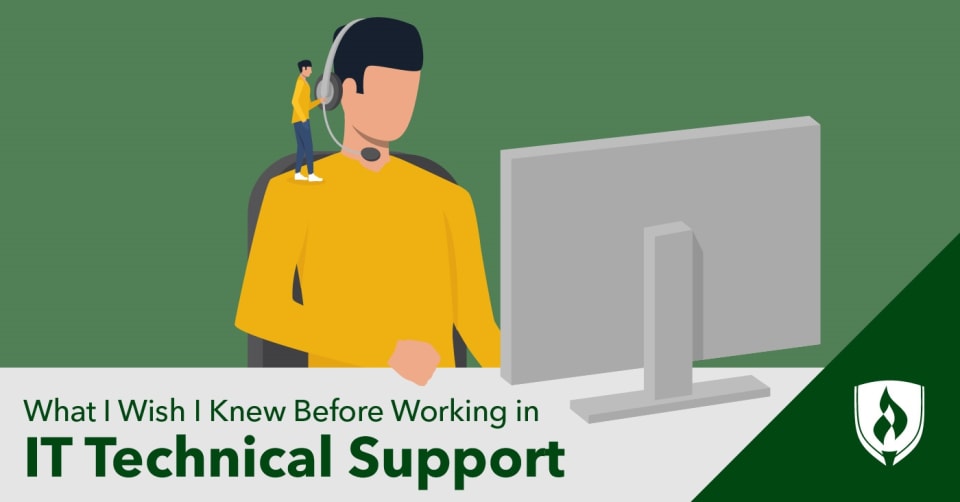
As the proud resident computer geek in your circle of family and friends, you’ve probably spent some time helping them deal with technological issues. Whether it’s setting up your grandmother with “the email,” as she adorably calls it, or troubleshooting your friend’s spotty wireless internet connection, you’ve probably wondered what it would be like to get paid for some of the technical assistance you hand out.
The natural first step for many people in your position is to consider a job working in IT technical support. These entry-level help desk roles may not be the most glamorous tech jobs out there, but they’re essential for keeping businesses across the world up and running.
But before you pursue a technical support role, why not learn from the people who’ve been there before? In this article, we asked IT professionals to share what they wish they knew before working in IT technical support.
What I wish I knew before working IT technical support
1. People will really respect your expertise—even for the small stuff
In IT technical support, you’ll run into plenty of people who feel totally baffled by aspects of technology that might seem very basic to you.
“I was surprised by the number of things that seemed like simple tasks that my customers didn’t know or thought were magic,” says Edward Marchewka, founder of CHICAGO Metrics®. He reflects that when you are a service professional, and you’re good at your job, it’s normal that people would rely on your help. If it seems super basic to you, that’s just a sign that you have expertise.
Rodney Riley, IT manager at Online Turf, says, “Even today I still make the mistake of presuming others know about [certain] concepts because they are competent in one technical field.”
“As an IT support professional of almost any level, you tend to forget how much knowledge you have relative to the average user, even those who are technically proficient,” says Riley. He explains it can be easy to assume that someone with expertise in web development or database administration will immediately be on the same wavelength as you when you’re assisting them, but often, they do not have the same broad base of IT knowledge.
“IT support technicians have a very broad, jack-of-all-trades skill set,” Riley says.
Bottom line? Don’t sell your work—even the seemingly routine tasks—short.
2. A little empathy from you can go a long way
Technological issues can be super frustrating for people who don’t understand what’s going on. For many, technology is a means to an end—the thing they need to function to get their work done. You may be super enthusiastic about your work and want to go into great detail about what you’re doing to fix a problem or why something isn’t working, but if the user is confused, you might not be making the situation better.
“Connect with the customer and show some empathy,” Marchewka says. Try to read the entire situation and not just the technical problem at hand. If you can respond to each client in a way that includes their concerns and helps them feel understood, you will make everyone’s job easier. “This helped me immensely when I was doing field service IT support,” Marchewka says.
3. Your experience will enrich your future roles
No matter how far you climb the ranks in IT, the practical experience you gain while working in a tech support role remains valuable.
“Even as an executive, you still need to assist the people you work with,” says Leo Richardson, CEO of NewAwning. “Instead of fixing printers and upgrading computers, you are now dealing with more complex systems that have multiple stakeholders.”
You’ll run into so many different problems and solutions in IT technical support, it’s probably one of the most immersive ways to engage with technology and learn hands-on. Take advantage of that benefit by trying to understand why things work and don’t work as you go. “Try to understand how the various systems work together. Truly grasp the way information moves throughout a network and the why behind what is happening in your environment,” Marchewka says.
4. You’ll learn how to hunt down the answers
Sure, eventually you’ll practically be able to troubleshoot a printer or a wireless network in your sleep. But a major part of this role is troubleshooting tricky issues that you have no firm idea of how to handle. Don’t beat yourself up about it.
“Nobody knows everything about anything,” Riley says. “Those who are successful merely know how to quickly and efficiently find the answers to things they do not know.”
Working in IT technical support isn’t like taking a multiple-choice exam. You can use nearly any resource out there to find the solution to a problem you have—whether it’s from the internet or the expertise of a coworker. As time goes on, you’ll get better at tracking down exactly what you need.
5. IT technical support can be the launch point into more advanced roles
The experience you gain in this job is invaluable. Many IT professionals begin in IT technical support and use that time to decide which aspects of IT they want to gain more training or experience in. Some find they love working with hardware and networking, others move into systems or network administration, and others may take their broad base of IT skills and apply them to more business-centric roles like IT project management. There’s a huge range of possibilities to pursue, and an IT technical support role certainly won’t hurt to have on a resume.
You’ll need a mix of good timing, personality, certifications and experience to truly stand out for advancement.
6. Your people skills will be tested
“Some people expect it to be always playing with fun new technologies and developing new infrastructure,” says Jason Silverglate, CEO of Continuous Networks. “You will be dealing with irate, angry and sometimes mean people—you need to be able to accept that and deal with it.”
This is true of any job that requires an element of customer service; sometimes, you’re just going to be stuck dealing with people at their worst. The positive to all of this is that you’ll learn how to deescalate a lot of tense situations and even make people’s day when you come through with the fix.
7. Network and system maintenance is a large part of the role
Many people think IT technical support is solely about dealing with users’ problems, creating tickets and working through them. But that’s not always the case, according to Riley.
“The amount of behind the scenes work that goes into ensuring the network and all its associated paraphernalia performs well all day, every day is by far the biggest aspect of the job—not end-user support.”
While it may depend on the specific organization or role you’re working for, often IT support teams can focus their time on assisting with preventative maintenance efforts that move beyond just strictly resolving individual user issues.
8. Your career path is in your own hands
Working in an IT tech support role is a versatile starting point for many tech careers. You’ll have the opportunity to dive into a wide variety of systems and gain valuable practical experience. That said, Richardson says it’s up to you to define your own path.
“If you want to be a software engineer, code in your spare time and contribute to open-source projects,” Richardson says. “If you’re looking to be a [database administrator], begin working with that group in support of their servers.”
Career advancement into a new role isn’t typically going to be spoon-fed to you—you’ll need to take the initiative.
9. Pack your patience
There are going to be times when no matter what you do to simplify and explain, the client or user just can’t seem to figure it out. Other times, the user may be under a lot of stress and less-than-pleasant to work with. You’ll be okay as long as you don’t take it personally.
“Patience, patience, patience,” Silverglate says. “A tech needs to talk to [a user], not at them while explaining things in simple terms a child can understand.”
IT technical support and beyond!
If this closer look at the crucial role of IT support feels encouraging, what are you waiting for? The experience you earn while working in an IT technical support role will definitely be a big part of what employers are looking for when hiring for more advanced roles. This role can provide a wealth of useful experience, and better yet, the path to getting started doesn’t have to be long and drawn out. The fully online Rasmussen University Information Technology Support Certificate program provides an excellent starting point for IT professionals and can be completed in as few as six months.1 Intrigued? Check out the IT Support Certificate program page to learn more.
1Completion time is dependent on transfer credits accepted and the number of courses completed each term.
Chicago Metrics is a registered trademark of Chicago Metrics, LLC.




